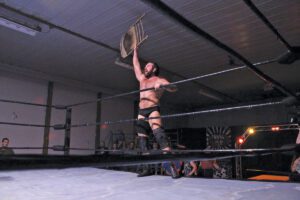The air in Building G at the Washtenaw Farm Council Grounds was chilly but abuzz with energy in mid-May. When a dapper showman in a blue suit and pink tie announced that the Midwest Pro Wrestling Alliance matches were being recorded for a Roku channel, the audience—a diverse crowd of families, older couples, and single people—roared.

Midwest Pro Wrestling Alliance wrestler Jake Something.
Lou Crank, an energetic older “face” (in wrestling parlance, a good guy) strutted, performed acrobatic takedowns, and bellowed in indignant rage at cheap shots from his opponents, a flamboyant tag-team duo called Studio 86, who wore neon green outfits and was fond of hip-thrusting dances. Crank’s partner, a human boulder in a red singlet known only as Tony, sent the “heels” flying out of the ring. The catchphrase of Freedom Ramsey, a cute young face from Detroit who resembles Michael B. Jordan but with more Spandex, was his own first name, screaming à la William Wallace in Braveheart. When his cackling, cornrowed opponent, Shawn Blaze, attempted to choke him with his sweatband and all seemed lost, the audience screamed “FREEDOM!” as if to give him power. It worked.
There were two women’s fights, the only bouts where the announcer chivalrously refrained from broadcasting the wrestlers’ weights. The star was an intimidating “heel” in a black-and-red outfit named Khaos, who moved with a predatory slouch. Khaos hails from Grand Rapids, a city which the audience repeatedly and loudly demanded she go back to. After dispatching her opponents, she seized the mic from the terrified referee and intoned, “This is my promotion.” Like any good heel, she stonily ignored a young girl seeking a high five as she marched out of the ring.
The main event was between Jake Something, a handsome lumberjack type wearing black briefs and not much else, and the defending champion, the mobster-esque Chuck Cold, who wore a pin-striped suit and was accompanied by a cowering trainer carrying a fuzzy pink fan. After an intense match that involved a folding chair, a length of chain, multiple shirts being ripped off, Chuck’s assistant being thrown out of the ring, a judge taking matters into his own hands, and the combatants tipping over a metal barrier and nearly falling onto a spectator and his young daughter (neither seemed especially concerned), Jake emerged victorious.
Staged violence alternated with wholesome, family-oriented pieties. After winning his round, Freedom Ramsey delivered a Mother’s Day speech to his own mother. As she stood beaming outside of the ring, he thanked her for supporting his wrestling training. “I stand here before you today as your champion,” he gushed, a bouquet in hand. “So, Mom, everything I put you through, I just want to say thank you, and from the bottom of my heart …”
His speech was cut off by Blaze, whose truly fantastic kick to the throat sent Ramsey flying dramatically backward, landing face down and motionless. To thunderous boos, Blaze grabbed the bouquet and offered a single flower to Ramsey’s mother. She giggled and turned away.
The adoring children in the audience added energy to the evening. One heel, after stealing his opponent’s prize money despite losing fair and square, prompted a small boy to start a rousing chant of “you suck!” During intermission, that same heel could be found playing a game of tag with the kids, still in character. “It’s my money, and you aren’t getting it back,” he crowed.
Pro wrestling is a form of theater, more than a century old. Everyone in the ring, from the wrestlers to the referees to the sidekicks to the judges, is playing a character. The outcomes are predetermined. Everyone knows this—yes, the kids too—but for a couple of hours everyone gives in to the heightened reality of the ring, the impressive physicality and charisma on display (this willing suspension of disbelief is known as kayfabe, etymology unknown).
I’ll confess that, coming into the event, I knew essentially nothing about the art form, aside from a handful of famous names (The Rock, Hulk Hogan, Vince McMahon) that have managed to bubble up into the mainstream. I had no idea what to expect. Despite this, I still quickly found myself joining in the cheers, the “you suck”s, the gasps at every double cross. Pro wrestling may be “fake,” but emerging into the brisk spring night, I felt like I had experienced something thrillingly, electrically real.
“Collision,” hosted by the Midwest Pro Wrestling Alliance, will return to the Washtenaw Farm Council Grounds on July 15 and 22.